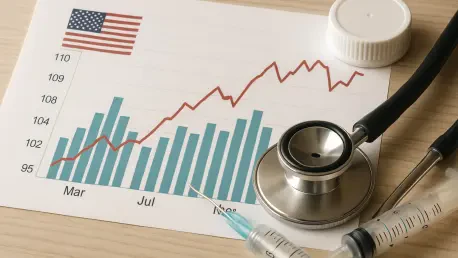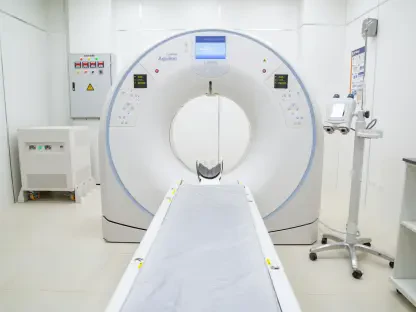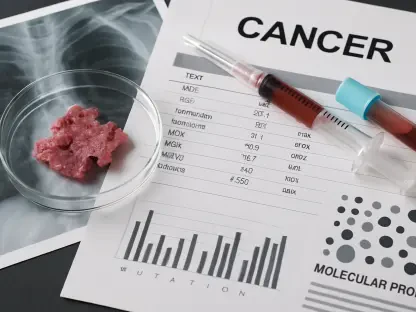The US medical technology industry finds itself at a critical juncture as the Trump administration has rolled out a Section 232 investigation through the Department of Commerce (DOC), announced on September 25. This probe, designed to evaluate the national security risks tied to importing essential healthcare products such as medical devices, equipment, consumables, and personal protective equipment (PPE), has sparked immediate unease across the sector. Within hours of the announcement, stock prices for major medtech companies plummeted, reflecting deep investor concerns about the looming possibility of tariffs or quotas that could disrupt supply chains and inflate costs. As the investigation unfolds, its implications extend beyond immediate financial reactions, touching on broader issues of trade policy, national security, and the future of healthcare delivery in the United States. This article delves into the multifaceted impact of this probe, exploring market responses, historical precedents, industry perspectives, and overarching policy trends shaping the medtech landscape.
Unpacking the Investigation’s Reach and Purpose
The Section 232 investigation, spearheaded by the DOC under the Trump administration, represents a significant move to scrutinize the reliance on foreign imports for critical healthcare products. Detailed in the Federal Register on September 26, the probe targets a wide array of items integral to the nation’s health infrastructure, from sophisticated medical devices to everyday consumables and PPE. Led by Deputy Assistant Secretary for Strategic Trade Julia Khersonsky, the DOC has opened a narrow 21-day window for public input, seeking insights into potential risks such as foreign export restrictions, the strategic control of supplies by other nations, and the competitive disadvantages posed by foreign subsidies or unfair trade practices. This comprehensive approach signals a deep concern over national security vulnerabilities, particularly in a sector as vital as healthcare, where dependency on imports could pose significant risks during crises or geopolitical tensions.
Beyond the immediate scope, the investigation’s intent appears to be twofold: safeguarding national interests while potentially reconfiguring the economic framework for medtech companies operating in the US. The focus on evaluating the feasibility of reducing import reliance suggests a push toward self-sufficiency, which could have long-term implications for how these firms source materials and manufacture products. Additionally, the probe’s examination of predatory trade practices hints at a broader agenda to level the playing field for domestic producers, though the path to achieving this remains uncertain. The stakes are high, as any resulting policy measures could reshape cost structures and market dynamics, affecting not only industry players but also healthcare providers and patients who depend on affordable access to these critical goods. This investigation, therefore, stands as a pivotal moment for assessing both security and economic priorities in the medtech arena.
Market Fallout and Investor Apprehensions
The financial markets reacted swiftly and decisively to the announcement of the Section 232 investigation, with the medtech sector bearing the brunt of investor unease. On the very day of the announcement, prominent companies like GE HealthCare and Becton Dickinson experienced share price declines exceeding 4%, closing at $71.50 and $180.59, respectively. Other notable firms, including Intuitive Surgical and Insulet, also saw their stocks dip, painting a picture of widespread concern across the industry. This immediate downturn reflects a palpable fear among investors that protective measures, such as tariffs or quotas, could introduce significant cost burdens, disrupt established supply chains, and ultimately erode profit margins for these companies, many of which rely heavily on global sourcing for components and finished products.
Delving deeper into the investor psyche, the apprehension stems from the potential ripple effects of such trade restrictions on the broader healthcare ecosystem. Should tariffs be imposed, the increased costs of imported goods could cascade down to hospitals and clinics, which are often already operating on tight budgets. This, in turn, might lead to higher prices for patients or reduced access to cutting-edge medical technologies, a scenario that investors are keenly aware of as they reassess the risk profiles of medtech stocks. Moreover, the uncertainty surrounding the investigation’s timeline and outcomes adds another layer of volatility, making it challenging for market participants to predict long-term impacts. As a result, the initial market reaction serves as a stark reminder of how intertwined trade policy and financial performance have become in this critical industry.
Learning from Past Trade Probes
The medtech sector’s anxiety over the current investigation is not without foundation, as it is informed by the outcomes of previous Section 232 probes under the Trump administration. Over the course of recent years, similar investigations targeting industries such as steel, automobiles, and pharmaceuticals have often culminated in the imposition of tariffs or other restrictive measures. This pattern has created a precedent that looms large over the current situation, raising fears that the medtech industry could face comparable trade barriers. Such outcomes would likely translate into elevated operational costs for companies, as they grapple with higher import duties or the need to overhaul supply chains to prioritize domestic sources, which may not always be readily available or cost-effective.
Compounding these concerns is the potential impact on global competitiveness and innovation within the medtech field. Historically, when tariffs have been applied in other sectors, they have sometimes led to retaliatory trade actions from other countries, further complicating international partnerships and market access. For an industry that thrives on cutting-edge research and cross-border collaboration, such disruptions could hinder the development and distribution of life-saving technologies. Additionally, the downstream effects on pricing could strain relationships with healthcare providers, who may struggle to absorb or pass on increased costs. This historical context underscores the gravity of the current probe, as stakeholders brace for decisions that could redefine the economic landscape for medical technology in the United States.
Industry Voices and Potential Upsides
While the market’s initial response to the investigation has been overwhelmingly negative, certain industry leaders are striving to present a more balanced perspective. The Advanced Medical Technology Association (AdvaMed), represented by CEO Scott Whitaker, has articulated a willingness to engage constructively with the administration during this process. AdvaMed views the probe as an opportunity to spotlight the robustness of US medtech manufacturing and advocate for policies that could enhance domestic production without resorting to punitive tariffs. The argument here is that reducing trade barriers, rather than imposing new ones, could stimulate job creation and economic growth within the sector, ultimately benefiting the broader healthcare system through improved affordability and access to essential technologies.
This optimistic stance introduces a counterpoint to the prevailing investor pessimism, suggesting that the investigation’s outcome is not necessarily destined to be detrimental. If the DOC’s findings lead to incentives for local manufacturing or other supportive measures, the medtech industry could emerge stronger, with a reduced reliance on foreign imports and a more resilient supply base. Such a scenario would align with national security goals while fostering innovation and economic stability. However, achieving this balance will require careful navigation of complex policy considerations, as well as robust dialogue between industry stakeholders and government officials. The diversity of opinions within the sector highlights the uncertainty of the probe’s impact, keeping the door open for both challenges and opportunities as the process unfolds.
Policy Shifts and Supply Chain Vulnerabilities
The Section 232 investigation into medtech imports is emblematic of a broader policy shift under the Trump administration, where national security increasingly intersects with trade decisions. This trend, particularly pronounced in the healthcare sector, reflects a heightened awareness of supply chain vulnerabilities that have been exposed since the COVID-19 pandemic. The reliance on foreign sources for critical items like PPE has emerged as a focal point of concern, prompting bipartisan support for securing domestic access to essential goods. The DOC’s emphasis on evaluating risks such as supply control by foreign nations underscores a strategic priority to mitigate potential disruptions, especially in times of crisis when access to medical resources is paramount.
Furthermore, the investigation’s focus on reducing import dependency and addressing foreign subsidies points to a potential reshaping of the competitive environment for US medtech firms. Should the outcome favor protective measures like tariffs, companies may face immediate cost pressures, but alternative approaches, such as government incentives for domestic production, could offer a more sustainable path forward. This policy direction also raises questions about the long-term structure of global supply chains in healthcare, as firms may need to invest in localized manufacturing capabilities to align with national priorities. As such, the probe serves as a catalyst for reevaluating how the industry balances economic efficiency with security imperatives, a debate that will likely influence trade policies across multiple sectors in the years ahead.
Reflecting on Strategic Next Steps
Looking back, the announcement of the Section 232 investigation on September 25 marked a pivotal moment for the US medtech industry, as evidenced by the sharp stock price declines that followed for major players like GE HealthCare and Becton Dickinson. The probe, driven by national security concerns over import reliance, echoed a recurring theme of trade protectionism under the Trump administration, with historical precedents suggesting a high likelihood of restrictive outcomes. Yet, voices from within the industry, particularly from AdvaMed, offered a glimmer of hope that constructive policies could bolster domestic manufacturing without punitive measures. Moving forward, stakeholders must prioritize active participation in the DOC’s feedback process to shape recommendations that balance security needs with economic realities. Additionally, medtech firms should explore strategic investments in local production capabilities to mitigate future risks, ensuring resilience against potential trade disruptions while supporting broader healthcare access and affordability goals.









